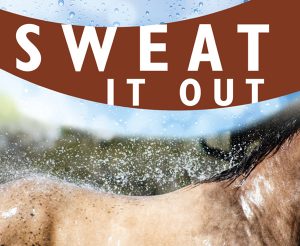Sweat It Out
Click here to read the complete article
220 – July/August, 2022
Sweating isn’t fun. It stinks. It stains clothing. It requires a bath after a hard workout. But sweat is imperative to the health of you, your horse, and all animals that have sweat glands. For horses that cannot sweat, it can make life absolutely miserable, or worse.
Sweating is the result of the very important cooling system of the body. When your body starts to heat up, whether it’s caused by trotting in deep sand during a Showmanship pattern, or by jumping a horse over fences, your brain will react by releasing sweat. Sweat comes from the more than 2.5 million endocrine glands spread throughout your body. Moisture released from sweat glands evaporates from your skin, thus cooling the body and decreasing your overall temperature.
Can you imagine living in a climate that’s constantly hot with high humidity, working outside daily, or even just standing out in a pasture with the sun beating down on your back? Your body is burning up, but you have no way of cooling yourself. That’s the misery many horses experience when living in Southern climates like Florida or even during a Northeastern summer. That’s why researchers at the University of Florida felt it was imperative to look deeper into anhidrosis, or the inability to sweat normally.
Building upon a study performed by Robert MacKay, DVM, professor emeritus in the Department of Infectious Diseases and Immunology at the University of Florida, about a decade ago, a team of researchers (including Dr. MacKay) wanted to expand on the findings. “There was a clue that this was a condition where genetics play an important role,” says Samantha Brooks, PhD, associate professor on equine physiology at the University of Florida. “Therefore, we felt that, as geneticists, we might be able to do some good for the horse.”
Dr. Brooks explains that Dr. MacKay’s original paper showed that anhidrosis runs in families, which meant there was likely a deeper connection than just running in breeds, as most horse owners already knew.
There was also a personal connection for the research team. Lead author of the study, Laura Patterson Rosa, animal science graduate student, rode show jumpers in Brazil prior to coming to Florida. One of her horses had anhidrosis, and she had to watch a horse she loved suffer from the condition and not be able to live up to his potential due to his lack of sweating ability.
“This study was very much a horse industry-driven study,” Dr. Brooks says. “We spoke with many horse owners, breeders, and riders that owned horses with anhidrosis, and they were desperate watching their horses suffer. Yet, they had nothing in their toolkit to use to improve their horse’s ability to sweat, nor their quality of life.”
Worse as They Age?
Click here to read the complete article
220 – July/August, 2022











